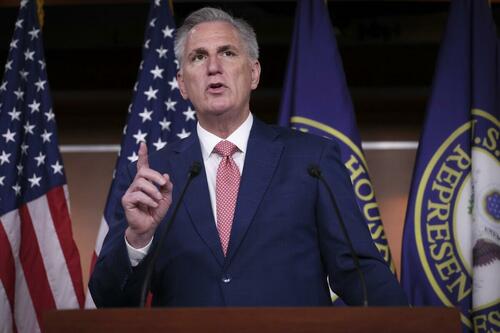
House Republicans are preparing to give the Treasury Department guidance if the White House and Congress can't agree to lift the nation's debt ceiling.
The plan was part of the private deal struck between House conservatives and Rep. Kevin McCarthy (R-CA) in order for McCarthy to win speakership, according to Rep. Chip Roy (R-TX), who helped broker the deal. Roy told the Washington Post that McCarthy agreed to adopt a payment prioritization plan by the end of the first quarter of the year.
According to the Post, the emergency contingency plan will need to include major spending cuts from the Biden administration, in exchange for which Republicans will sign off on raising the current limit of $31.4 trillion before the Treasury Department can't borrow any more.
On Friday, Treasury Secretary Janet Yellen said that the Treasury department will enact "extraordinary measures" next week so the government can keep its payment obligations - however she couldn't guarantee that the US will make it beyond early June without default.
Also on Friday, White House press secretary Karine Jean-Pierre made clear that the administration will not negotiate.
In the preliminary stages of being drafted, the GOP proposal would call on the Biden administration to make only the most critical federal payments if the Treasury Department comes up against the statutory limit on what it can legally borrow. For instance, the plan is almost certain to call on the department to keep making interest payments on the debt, according to four people familiar with the internal deliberations who spoke on the condition of anonymity to describe private conversations. House Republicans' payment prioritization plan may also stipulate that the Treasury Department should continue making payments on Social Security, Medicare and veterans benefits, as well as funding the military, two of the people said. -WaPo
That said, Democrats are preparing to push back on the plan, and will likely note that any hypothetical proposal to triage Social Security, Medicare and benefits for veterans and the military would still leave out 'huge swaths of critical federal expenditures on things such as Medicaid, food safety inspections, border control and air traffic control,' etc. Democrats will also likely accuse Republicans of pandering to bondholders, which include Chinese banks, vs. Americans.
"Any plan to pay bondholders but not fund school lunches or the FAA or food safety or XYZ is just target practice for us," said one senior Democratic aide.
In other Kevin McCarthy news, the newly minted speaker may be trying to win back the MAGA crowd, announcing on Thursday that he's open to the idea of "expunging" one or both of former President Trump's impeachments.
As the Epoch Times notes,
When asked about the possibility of erasing the impeachments during a Jan. 12 press conference at the Capitol, McCarthy replied that he would “have to look” at the situation, saying, “I understand why members would want to bring that forward.”
“Our first priority is to get our economy back on track, secure our borders, make our streets safe again, give parents the opportunity to have a say in their kids’ education, and actually hold government accountable,” he added. “But I understand why individuals want to do it, and we’d look at it.”
Trump was first impeached by the House in December 2019 over a phone call he had with Ukrainian President Volodymyr Zelenskyy. He was charged with abuse of power for allegedly pressuring Zelenskyy to investigate a political opponent, and with obstruction of Congress, but was ultimately acquitted of those charges by the Senate.
In 2021, Trump was impeached again for alleged “incitement of insurrection” following the Jan. 6 Capitol breach. Again, he was acquitted.
Previous Expungement Attempts
Last year, then-Rep. Markwayne Mullin (R-Okla.) led House Republicans’ attempts to expunge Trump’s impeachment record, introducing a resolution to erase the former president’s 2019 impeachment in March.
“So, what we’re doing with the resolution is just simply saying, ‘Hey, listen, Congress made a mistake,’” Mullin, now a senator, said at the time. “‘We impeached a president under Article One, Section Two, that shouldn’t have ever taken place.’”
In May, Mullin followed up the first bill with a second resolution to expunge Trump’s 2021 impeachment. That bill (pdf), citing 2020 election irregularities and the impeachment’s rushed nature, held that the impeachment process had failed to prove that the former president had committed “high crimes and misdemeanors” or engaged in an insurrection.
Although both of Mullin’s resolutions garnered some Republican support, neither was ever considered by the Democrat-controlled House.
A ‘Political Hoax’
Trump, for his part, has maintained that both the impeachments and the Jan. 6 Select Committee’s subsequent criminal referrals were simply partisan attempts to “sideline” him and prevent him from holding elected office again.
“The Fake charges made by the highly partisan Unselect Committee of January 6th have already been submitted, prosecuted, and tried in the form of Impeachment Hoax # 2,” the former president noted on Dec. 19 after the committee referred him to the Justice Department for prosecution.
In February 2020, after his first acquittal by the Senate, Trump was asked by reporters about the potential of a future expungement.
“That’s a very good question,” he said. “Should they expunge the impeachment in the House? They should because it was a hoax. It was a total political hoax.”
At the time, it was McCarthy who floated the idea, vowing to erase the impeachment if the Republican Party regained control of the House and he became speaker.
“I don’t think it should stay on the books,” McCarthy said.
Despite opposition from several Trump-aligned Republicans, McCarthy achieved his goal of becoming speaker of the House—with Trump’s backing—last week.
After a contentious week of intraparty negotiations, McCarthy secured the speakership in the 15th vote, attributing the victory to the former president’s support.
“I do want to especially thank President Trump,” he told reporters on Jan. 7. “I don’t think anybody should doubt his influence. He was with me from the beginning.”
House Republicans are preparing to give the Treasury Department guidance if the White House and Congress can’t agree to lift the nation’s debt ceiling.
The plan was part of the private deal struck between House conservatives and Rep. Kevin McCarthy (R-CA) in order for McCarthy to win speakership, according to Rep. Chip Roy (R-TX), who helped broker the deal. Roy told the Washington Post that McCarthy agreed to adopt a payment prioritization plan by the end of the first quarter of the year.
According to the Post, the emergency contingency plan will need to include major spending cuts from the Biden administration, in exchange for which Republicans will sign off on raising the current limit of $31.4 trillion before the Treasury Department can’t borrow any more.
On Friday, Treasury Secretary Janet Yellen said that the Treasury department will enact “extraordinary measures” next week so the government can keep its payment obligations – however she couldn’t guarantee that the US will make it beyond early June without default.
Also on Friday, White House press secretary Karine Jean-Pierre made clear that the administration will not negotiate.
In the preliminary stages of being drafted, the GOP proposal would call on the Biden administration to make only the most critical federal payments if the Treasury Department comes up against the statutory limit on what it can legally borrow. For instance, the plan is almost certain to call on the department to keep making interest payments on the debt, according to four people familiar with the internal deliberations who spoke on the condition of anonymity to describe private conversations. House Republicans’ payment prioritization plan may also stipulate that the Treasury Department should continue making payments on Social Security, Medicare and veterans benefits, as well as funding the military, two of the people said. –WaPo
That said, Democrats are preparing to push back on the plan, and will likely note that any hypothetical proposal to triage Social Security, Medicare and benefits for veterans and the military would still leave out ‘huge swaths of critical federal expenditures on things such as Medicaid, food safety inspections, border control and air traffic control,’ etc. Democrats will also likely accuse Republicans of pandering to bondholders, which include Chinese banks, vs. Americans.
“Any plan to pay bondholders but not fund school lunches or the FAA or food safety or XYZ is just target practice for us,” said one senior Democratic aide.
In other Kevin McCarthy news, the newly minted speaker may be trying to win back the MAGA crowd, announcing on Thursday that he’s open to the idea of “expunging” one or both of former President Trump’s impeachments.
As the Epoch Times notes,
When asked about the possibility of erasing the impeachments during a Jan. 12 press conference at the Capitol, McCarthy replied that he would “have to look” at the situation, saying, “I understand why members would want to bring that forward.”
“Our first priority is to get our economy back on track, secure our borders, make our streets safe again, give parents the opportunity to have a say in their kids’ education, and actually hold government accountable,” he added. “But I understand why individuals want to do it, and we’d look at it.”
Trump was first impeached by the House in December 2019 over a phone call he had with Ukrainian President Volodymyr Zelenskyy. He was charged with abuse of power for allegedly pressuring Zelenskyy to investigate a political opponent, and with obstruction of Congress, but was ultimately acquitted of those charges by the Senate.
In 2021, Trump was impeached again for alleged “incitement of insurrection” following the Jan. 6 Capitol breach. Again, he was acquitted.
Previous Expungement Attempts
Last year, then-Rep. Markwayne Mullin (R-Okla.) led House Republicans’ attempts to expunge Trump’s impeachment record, introducing a resolution to erase the former president’s 2019 impeachment in March.
“So, what we’re doing with the resolution is just simply saying, ‘Hey, listen, Congress made a mistake,’” Mullin, now a senator, said at the time. “‘We impeached a president under Article One, Section Two, that shouldn’t have ever taken place.’”
In May, Mullin followed up the first bill with a second resolution to expunge Trump’s 2021 impeachment. That bill (pdf), citing 2020 election irregularities and the impeachment’s rushed nature, held that the impeachment process had failed to prove that the former president had committed “high crimes and misdemeanors” or engaged in an insurrection.
Although both of Mullin’s resolutions garnered some Republican support, neither was ever considered by the Democrat-controlled House.
A ‘Political Hoax’
Trump, for his part, has maintained that both the impeachments and the Jan. 6 Select Committee’s subsequent criminal referrals were simply partisan attempts to “sideline” him and prevent him from holding elected office again.
“The Fake charges made by the highly partisan Unselect Committee of January 6th have already been submitted, prosecuted, and tried in the form of Impeachment Hoax # 2,” the former president noted on Dec. 19 after the committee referred him to the Justice Department for prosecution.
In February 2020, after his first acquittal by the Senate, Trump was asked by reporters about the potential of a future expungement.
“That’s a very good question,” he said. “Should they expunge the impeachment in the House? They should because it was a hoax. It was a total political hoax.”
At the time, it was McCarthy who floated the idea, vowing to erase the impeachment if the Republican Party regained control of the House and he became speaker.
“I don’t think it should stay on the books,” McCarthy said.
Despite opposition from several Trump-aligned Republicans, McCarthy achieved his goal of becoming speaker of the House—with Trump’s backing—last week.
After a contentious week of intraparty negotiations, McCarthy secured the speakership in the 15th vote, attributing the victory to the former president’s support.
“I do want to especially thank President Trump,” he told reporters on Jan. 7. “I don’t think anybody should doubt his influence. He was with me from the beginning.”
Loading…






